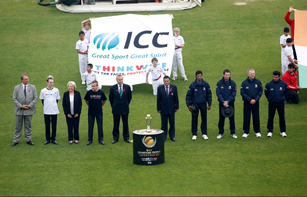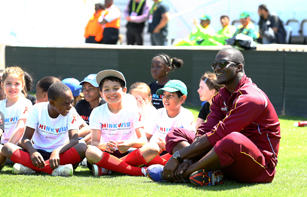UNICEF report shows that new infections among adolescents could be halved by 2020 with targeted and increased investment
NEW YORK, 29 November 2013 – A new report released today by UNICEF shows great progress has been made to prevent mother-to-child transmission of HIV, with more than 850,000 new childhood infections averted between 2005 and 2012 in low- and middle-income countries.
However, the new 2013 Stocktaking Report on Children and AIDS raises the alarm on adolescents, citing the need for increased global and national efforts to address HIV and AIDS among this vulnerable age group.
AIDS-related deaths amongst adolescents between the ages of 10 and 19 increased by 50 per cent between 2005 and 2012, rising from 71,000 to 110,000, in stark contrast to progress made in preventing mother-to-child transmission. There were approximately 2.1 million adolescents living with HIV in 2012.
With additional funding and increased investment in innovation, many of the challenges could be overcome, the report says.
A new analysis featured in the report shows that by increasing investment in high-impact interventions to about US$5.5 billion by 2014, 2 million adolescents, particularly girls, could avoid becoming infected by 2020. Investments in 2010 were US$3.8 billion.
“If high-impact interventions are scaled up using an integrated approach, we can halve the number of new infections among adolescents by 2020,” said UNICEF Executive Director Anthony Lake. “It’s a matter of reaching the most vulnerable adolescents with effective programmes – urgently.”
High-impact interventions include condoms, antiretroviral treatment, prevention of mother-to-child transmission, voluntary medical male circumcision, communications for behaviour change, and targeted approaches for at-risk and marginalized populations. This is in addition to investments in other sectors such as education, social protection and welfare, and strengthening health systems.
In contrast to adolescents, progress has been impressive in the area of preventing new HIV infections among infants. Some 260,000 children were newly infected with HIV in 2012, compared to 540,000 in 2005.
“This report reminds us that an AIDS-free generation is one in which all children are born free of HIV and remain so––from birth and throughout their lives––and it means access to treatment for all children living with HIV,” said Michel Sidibe, Executive Director of UNAIDS. “It also reminds us that women’s health and well-being should be at the centre of the AIDS response. I have no doubt that we will achieve these goals.”
Thanks to new, simplified life-long antiretroviral treatment (known as Option B+), there is a greater opportunity to effectively treat women living with HIV and to prevent the transmission of the virus to their babies during pregnancy, delivery, and through breastfeeding. This treatment involves a daily one-pill regimen.
“These days, even if a pregnant woman is living with HIV, it doesn’t mean her baby must have the same fate, and it doesn’t mean she can’t lead a healthy life,” said Lake.
Some of the most remarkable successes were in high HIV burden countries in sub-Saharan Africa. New infections among infants declined between 2009 and 2012 by 76 per cent in Ghana, 58 per cent in Namibia, 55 per cent in Zimbabwe, 52 per cent in Malawi and Botswana, and 50 per cent in Zambia and Ethiopia.
The new report also emphasizes that for an AIDS-free generation to become a reality, more children living with HIV should receive antiretroviral treatment. Only 34 per cent of children living with HIV in low- and middle-income countries received the treatment they needed in 2012, compared to 64 per cent of adults. As a result, an estimated 210,000 children died from AIDS-related illnesses in 2012.
Innovations and new ways of working are making testing and treatment more accessible, effective and efficient. One example is the use of mobile phones in Zambia and Malawi to quickly deliver HIV test results. This has allowed mothers to receive diagnoses for their babies much faster than through results delivered by hand.
The challenge now is to apply the knowledge that already exists, continue to focus on the most vulnerable and marginalized children and adolescents, and pursue new opportunities and innovations—while using finite resources as efficiently and effectively as possible.
“The world now has the experience and the tools to achieve an AIDS-free generation. Children should be the first to benefit from our successes in defeating HIV, and the last to suffer when we fall short,” said Lake.
The report will be available at www.childrenandaids.org
Attention broadcasters: Video news stories and b-roll from Botswana, Ivory Coast, and Malawi are available at http://weshare.unicef.org/mediaresources
Note for Editors:
- About the simplified life-long antiretroviral treatment (Option B+):
UNICEF is supporting countries as they transition to the new simplified life-long antiretroviral therapy (Option B+) for all pregnant women living with HIV. The new treatment is in the form of one pill, taken once a day (compared to the previous treatment of up to six pills per day).This treatment can be provided at the community level, at local primary care facilities. It keeps mothers healthier, as they continue taking it even after giving birth, through breastfeeding and beyond. Malawi was a pioneer in offering the Option B+ treatment in 2011, resulting in massive expansion of the treatment coverage for both pregnant and breastfeeding women living with HIV. By June 2013, 13 of the 22 Global Plan priority countries had adopted the same policy of offering life-long treatment.
- About the Stocktaking Reports:
Stocktaking reports on Children and AIDS are the flagship publications of the Unite for Children, Unite against AIDS campaign. UNICEF leads the production of these publications as part of its commitment to the Joint United Nations Programme on HIV/AIDS (UNAIDS), in collaboration with UNAIDS and the other 10 UNAIDS co-sponsors. The new ‘Children and AIDS: Sixth Stocktaking Report’ is the first of its kind since 2010.
About UNAIDS
The Joint United Nations Programme on HIV/AIDS (UNAIDS) leads and inspires the world to achieve its shared vision of zero new HIV infections, zero discrimination and zero AIDS-related deaths. UNAIDS unites the efforts of 11 UN organizations—UNHCR, UNICEF, WFP, UNDP, UNFPA, UNODC, UN Women, ILO, UNESCO, WHO and the World Bank—and works closely with global and national partners to maximize results for the AIDS response. Learn more at unaids.org and connect with us on Facebook and Twitter.
About UNICEF
UNICEF promotes the rights and wellbeing of every child, in everything we do. Together with our partners, we work in 190 countries and territories to translate that commitment into practical action, focusing special effort on reaching the most vulnerable and excluded children, to the benefit of all children, everywhere. For more information about UNICEF and its work visit: www.unicef.org Follow us on Twitter and Facebook
For further information, please contact:
Rita Ann Wallace, UNICEF Media New York, tel: + 1 212 326 7586, rwallace@unicef.org
Iman Morooka, UNICEF Strategic Communications, New York, tel: + 1 212 326 7211, imorooka@unicef.org
Sophie Barton-Knott, UNAIDS Geneva, tel: +41 22 791 1697, bartonknotts@unaids.org








